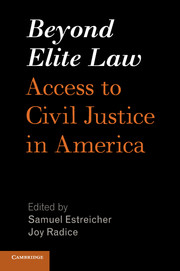Book contents
- Frontmatter
- Contents
- Beyond Elite Law
- Foreword
- List of Contributors
- Overview
- Overview
- PART I CURRENT STATE OF ACCESS TO LEGAL SERVICES
- PART II SOURCES OF LEGAL SERVICES ASSISTANCE FOR WORKING AMERICANS
- 10 Evolution of Legal Services in the United States: From the War on Poverty to Civil Gideon and Beyond
- 11 The Effect of Contingent Fees and Statutory Fee-Shifting
- 12 The Market for Recent Law Graduates
- 13 Clinical Legal Education and Access to Justice: Conflicts, Interests, and Evolution
- 14 Loan Repayment Assistance and Access to Justice
- 15 Federally Funded Civil Legal Services
- 16 New York's Lawyer Referral Services
- 17 Growth of Large Law Firm Pro Bono Programs
- 18 Institutionalizing Pro Bono
- 19 Pro Bono as a Second Career
- 20 Employer-Provided Legal Services for Employment Claims
- 21 Company-Provided Legal Services
- 22 Individualized Justice in Class and Collective Actions
- PART III FASHIONING A REFORM AGENDA
- PART IV CREATING A CULTURE OF SERVICE
- Index
15 - Federally Funded Civil Legal Services
from PART II - SOURCES OF LEGAL SERVICES ASSISTANCE FOR WORKING AMERICANS
Published online by Cambridge University Press: 05 May 2016
- Frontmatter
- Contents
- Beyond Elite Law
- Foreword
- List of Contributors
- Overview
- Overview
- PART I CURRENT STATE OF ACCESS TO LEGAL SERVICES
- PART II SOURCES OF LEGAL SERVICES ASSISTANCE FOR WORKING AMERICANS
- 10 Evolution of Legal Services in the United States: From the War on Poverty to Civil Gideon and Beyond
- 11 The Effect of Contingent Fees and Statutory Fee-Shifting
- 12 The Market for Recent Law Graduates
- 13 Clinical Legal Education and Access to Justice: Conflicts, Interests, and Evolution
- 14 Loan Repayment Assistance and Access to Justice
- 15 Federally Funded Civil Legal Services
- 16 New York's Lawyer Referral Services
- 17 Growth of Large Law Firm Pro Bono Programs
- 18 Institutionalizing Pro Bono
- 19 Pro Bono as a Second Career
- 20 Employer-Provided Legal Services for Employment Claims
- 21 Company-Provided Legal Services
- 22 Individualized Justice in Class and Collective Actions
- PART III FASHIONING A REFORM AGENDA
- PART IV CREATING A CULTURE OF SERVICE
- Index
Summary
Legal services organizations funded in part by federal grants have provided a national safety net of civil legal assistance for the poor since the 1970s. In this chapter, Joy Radice explains how legal service offices are structured and funded, who is eligible for their free legal assistance, and how local legal services organizations triage their resources and stretch their shrinking federal dollars to reach as many eligible people as possible.
The Legal Services Corporation (LSC) is the largest source of funding for civil legal services in the country. Its grantees include 799 field offices and over 4,000 attorneys nationwide. In 2013, LSC, which is funded by Congressional appropriations, provided its grantees $342,778,665. The LSC offices in turn closed over 758,689 cases involving three basic types of legal assistance defined by the LSC's regulations: legal advice and counsel (60% of closed cases in 2013), brief services (16% of closed cases), and extended legal services (25% of closed cases).
This chapter examines how this network of programs is structured, who qualifies for LSC-supported legal services, and what type of assistance is provided. Over the past two decades, Congressional funding has declined dramatically, while the number of Americans who financially qualify for LSC assistance has increased to about 65 million according to U.S. Census Bureau estimates.
LSC CLIENT DEMOGRAPHICS
LSC grantees serve clients in all 50 states and every U.S. territory – from dense metropolitan areas to rural counties where lawyers might have to travel for hours to visit clients. LSC clients are farmers, tenants, parents, students, and veterans. The majority of clients, 70%, are women, while 15% are seniors over 60, and only 2% are children. LSC clients are also diverse racially and ethnically (see Table 15.1).
ELIGIBILITY FOR LSC-FUNDED SERVICES
To be eligible for LSC-funded civil legal services, an applicant's pre-tax income must fall at or below 125% of the federal poverty guidelines and, as Table 15.2 shows, that number is keyed to the size of a person's household. Federal regulations require LSC to establish maximum income levels for eligible households based on the federal poverty guidelines published by the Department of Health and Human Resources (DHS).
- Type
- Chapter
- Information
- Beyond Elite LawAccess to Civil Justice in America, pp. 249 - 260Publisher: Cambridge University PressPrint publication year: 2016

